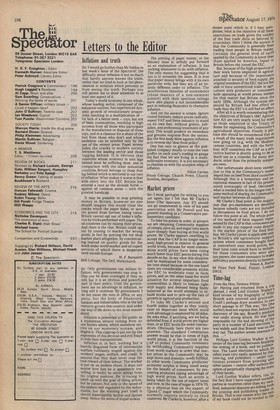Market prices
Sir: I must apologise for writing to you yet again, but I felt that Mr Clarke's letter (The Spectator, July 27) should not go unanswered in view of his past association with Mr Powell and his present standing as a Conservative parliamentary candidate.
To take his points in order, at present we are obtaining Community supplies of cereals, olive oil, and sugar very much more cheaply than buying at free world prices. Mr Clarke appears unwilling to accept that the CAP is no longer extremely high-priced in relation to general world levels, because for most commodities world prices have been rising much faster than EEC prices during this decade so far. In my view this situation will be maintained for some considerable time ahead because on the one hand there are considerable pressures within the EEC to moderate rises in farm prices, and on the other hand the world situation for several important food commodities is likely to remain tight with supply and demand being finely balanced as the world attempts to rebuild stocks and to jack-up the rate of growth in agricultural production.
To take Mr Clarke's second and fourth points together as they jointly raise an important issue which could with advantage to examined by all sides. He asks what, if anything, are we being defended from if world prices are higher than, or at EEC levels for some commodities. Obviously here there are two answers. The standard Commission answer would be that in times of high world prices, it is the function of the CAP to protect Community consumers by withholding Community supplies from world markets in order that market prices in the Community may be kept down and domestic needs fulfilled. In other words Community producers' economic surplus is being taxed away for the benefit of consumers, by preventing producers taking advantage of high world prices. Such an action is being taken by the use of export taxes and now, in the case of sugar in 1974/75, by a physical ban on the export of 'Quota C' sugar which the Community normally exports entirely to third countries. Mr Clarke is, however, after a deeper point which is, if I may paraphrase, what is the objective of all these restrictions on trade given the validity of the free trade dicta so beloved by economists. Here I think the answer is that the Community is generally freer trading than people in Britain realise. Certainly the general level of tariff applied by the Community is lower than those applied by America, Japan or Britain before she joined the EEC.
But, because of the high proportion of their work forces employed in agriculture and because of the importance attached to security of food supply, the original members of the EEC did not feel able to have unrestricted trade in agriculture with producers or consumers both operating at world prices; neither for that matter has Britain since the early 1930s. Although the system employed by Britain had less effect on trade than the EEC's it still had an effect After all it is worth remembering that the objectives of Britain's 1947 Agriculture Act are very nearly word for word as those employed in the Treaty of Rome for expressing the Community's agricultural objectives. Finally it perhaps also should be remembered that as a result of the many trade negotiations now going on (e.g. with the Mediterranean countries, and with the fortyfour ACP countries) the CAP as a protective barrier is shortly going to be as much use as a colander for many products, other than the primarily temperate ones.
One unfortunate short-term exemrtion to this is the Community's recent import ban on beef from third countries. Although this is a temporary and exceptional measure in fact of the present world oversupply of beef. Obviously what is needed here in the longer-run is some method of sharing the CommunitY beef market between all suppliers. Mr Clarke's final point is the sugges" tion that pro-marketeers are deceitful because subsidy costs are not included in discussions on food prices. I do not follow this point at all. The whole Point of the method of farm support represented by the CAP is that consumers are made to pay any support costs directly in the market prices of the food they buy. Mr Clarke's point is applicable only to Britain's old agricultural supPort system where consumers bought food at somewhere near world prices, but their total costs would have to include, for those consumers who were also tax-payers, the taxes necessary to Make deficiency payments directly to farmers
Simon A. Harris
64 Fawe Park Road, Putney, Lond°r1
SW15.


































 Previous page
Previous page